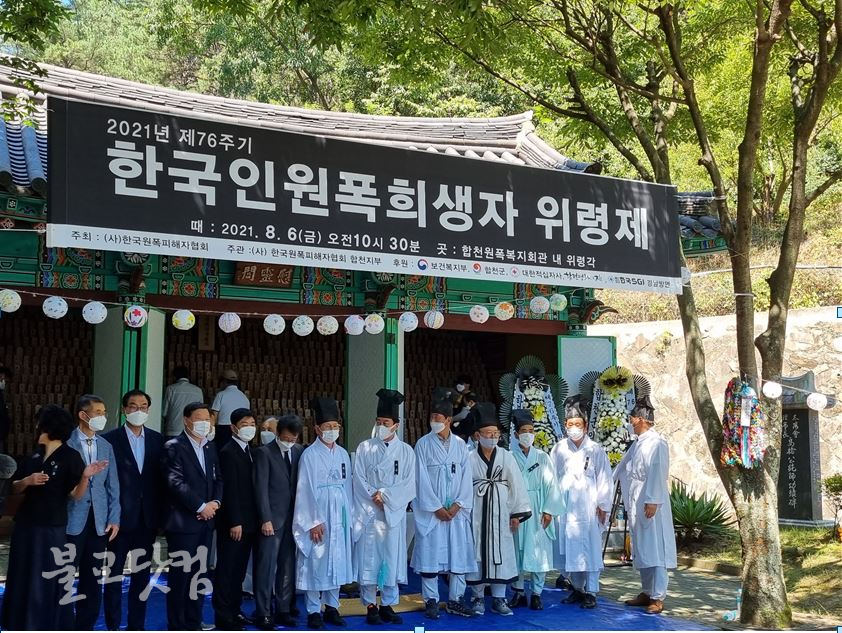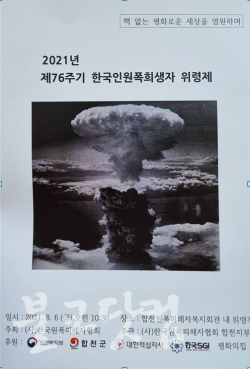There is a need for a ‘parliamentary’ mechanism to control nuclear risks and to gather the will of people of global village.
Among the victims of the atomic bombs dropped in Hiroshima and Nagasaki on August 6 and 9, 1945, the number of Korean victims reached 100,000. A memorial ceremony to commemorate the sacrifice was held in Hapcheon a few days ago. It is a commemorative event to inform the Koreans of the atomic bomb victims and to heal the physical and mental suffering they are experiencing.
One day before the memorial ceremony, on-line seminar was held both in Korea and Japan simultaneously. Professor Emeritus Takao Matsumura (Keio University) gave a presentation titled “American Responsibility for Atomic Bomb Dropping and Korea-Japan Solidarity”. The writer of this paper, who is vice president of the Korea Society for Nuclear Phaseout, participated in the seminar as a panelist. This paper is the subject of the discussion in the seminar.

As to the forced conscription issue, as stated by Choi Bong Tae who is a lawyer of the Korean Bar Association, the Supreme Court of Japan made a final judgement that “The Japanese government or companies should voluntarily relieve forced laborers within the framework of San Francisco Peace Treaty” in April 2007. It is encouraging that Professor Matsumura supports this judgement by clarifying the concept of “forced arrest” by the state. Professor Matsumura emphasized the willfulness and deception of the United States over the atomic bombing. He listed two points. First he cited the fact that the United States deliberately deleted the provision of the retention of the emperor system in the signing so that Japan would not surrender early in order not to lose the opportunity to drop the atomic bomb. Secondly, he insisted that there was a non-government force which encouraged the dropping of the atomic bomb from the start. He cited the force as major financial capital. There has been people who knew about ‘the plan of large financial capital’, but it was the first opportunity that I saw a scholar formally mentioned it in academic paper.
Naturally, it was common sense that the United States had a great responsibility.
Even though military bases were the main target of atomic bombing, it is self-evident that a large number of civilians would be killed if the bomb is dropped on a city where many civilians live in. Although it was sufficiently possible to show the power of the atomic bomb in other ways, it was excessive use of force unprecedented in history of mankind to plan twice for mass killing. Matsumura’s explanation that private financial capital played a role in the decision urging mass killing is incredibly shocking.
In retrospect, it is a proof which reminds us of the root of the original sin of the Fukushima accident. That financial capital is now parasitizing nuclear energy. For example, Tokyo Electric Power Co. which caused the Fukushima accident, used its monopoly position to supply electricity exclusively for decades before the accident. The objective of financial capital was to maximize profits by dint of high electricity rates and low operating costs. Financial institutions were major shareholders holding nearly half of total stocks. However, after the Fukushima accident, the Japanese government achieved the status of major shareholder by injecting about 90 trillion won of public funds originating from taxes. Of course, the financial institutions were compensated for the loss in the process. The problem is that this kind of operating model is being expanded with the support of each country’s government.
The US government has stopped building nuclear power plants since the Three Mile Island accident in 1979. Trump government, however, sent a strong message that government could provide guarantees to financial institutions participating in construction of Texas nuclear power plant. This guarantee means that financial institutions will be guaranteed profits when they invest in nuclear power plants in consideration of risk costs. The Lee Myeong-bak administration’s export of nuclear power plant to the United Arab Emirates (UAE) was possible because the government gave private financial institution a special premium when the government provided collateral for financing close to $10 billion through Korea Exim Bank. Seventy-six years have passed since the atomic bombing in Hiroshima. I still feel a horrifying threat when I heard about the fact that financial capital forces which had haunted the global village for decades were deeply involved in the dropping of atomic bomb in Japan. What is the reason of such a horrifying behavior? It will become an important topic in modern world history in the future.
The current global village stands at the crossroad of energy transition and nuclear energy. Until this crisis came, the capital forces seeked after maximum interests at all costs. It is typically unethical behavior for capital forces to pass on losses such as nuclear accident or radioactive waste to the public or to the next generation.
The trouble maker is America. The United States has committed such contradiction as promoting nuclear energy and banning proliferation of nuclear weapons at the same time over 70 years. It is contradictory and crazy for U.S. to emphasize the nuclear umbrella and encourage the export of nuclear power plants which produce plutonium, material for nuclear weapons, to foreign countries.
Is the United States a country where decision-making is coming from capital power instead of the people?
Above all, although Japan is a party to the war, the issue of compensation for civilian sufferers of atomic bomb is a quite different problem. In principle, each civilian is entitled to compensation. Although the United States is suppressing the rights of civilians through the peace treaty, the essence of the innate right for compensation is not lost. Not to miss this essence is the fundamental mechanism for deterring the use of nuclear force.
The clues that give hope to us may be found from Korean victims and their descendants. The Supreme Court of Japan made a verdict in April 2007 that the individual rights of war victims were not substantively extinguished according to the San Francisco Peace Treaty. Due to indiscriminate nuclear attack, even the second and third generations, who did not exist at the time, are suffering for the rest of their lives. The US should compensate the Korean victims of the atomic bombing under colonial rule. They were not responsible for the war at all.

We must persevere in receiving reparations. If the reparation is realized, then it will make a landmark in the history of mankind. When Korean victims and their second and third generations receive compensation from the United States, it will be possible for individual Japanese civilians to receive compensation in principle someday. In the process, the risk and burden of using nuclear weapon by power holder can set a milestone on the way to nuclear disarmament. It is the gateway to peace. The testimonies of descendants of the bomb victims in Hapcheon and demand for compensation will become the root of nuclear control.
At the same time, we need to create an institution and system to control the nuclear threat to humanity at the global level. The recent erroneous judgment of Japanese government regarding discharge of Fukushima contaminated water, and the allowance by U.S. government and IAEA(International Atomic Energy Agency) are in the same context. IAEA is an organization which is not controlled by the United Nations. IAEA is not a spokesperson for the global mankind. It is a force that promotes nuclear power. ‘You cannot scratch your own back.’ Establishment of an organization which has a control function, separate from IAEA, is absolutely necessary. Humans are not perfect, considering the long history of evolution. In pursuit of power, humans are committing catastrophe without hesitation. This is a real crisis of humans.
Birds fly with two wings. People walk on two legs. Living organization consists of woof and warp. A family has parent. A country has administration and parliament. A balanced decision can be made only when there are complementary checks. Nowadays the global village is lame. The UN does not have a parliamentary function, and remains as an executive branch of a superpower called the United States. Moreover, an organization such as IAEA which promotes nuclear energy is not under the control of the United Nations. Meanwhile, within the United States, there are financial capital forces which operate actively in decision-making process. The objective of capital forces is to achieve maximum profit which is regarded more important than global safety and well-being.
Humanity is still in crisis. Even if we overcome climate crisis, we may not be free from horrific names such as Hiroshima, Nagasaki, Chernobyl and Fukushima. There must be an international organization with the function of a ‘parliament’ in which the will of global people operates. The leader of international parliament could be someone like Pope Francisco or Dalai Lama, for example. It is not difficult to gather the will of global people, in this revolutionary era of IT communication technology. We need to build a structure that gathers the will of 8 billion people in the global village, not just a few forces such as financial capital. This is the only way to make normal decisions through check and balance. By introducing international parliament, we can reduce the burden of the U.S. and overcome the climate crisis.
Original Article >> http://www.bulkyo21.com/news/articleView.html?idxno=49396
(translated by LEE Sanghoon)


